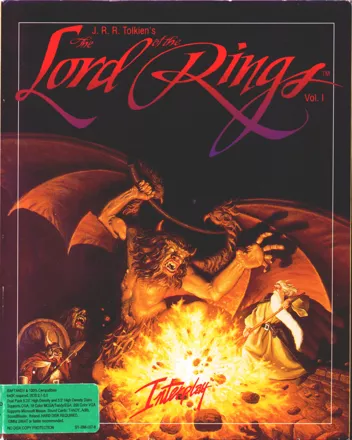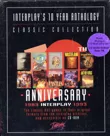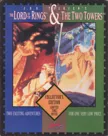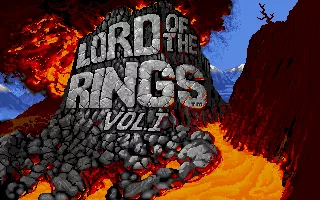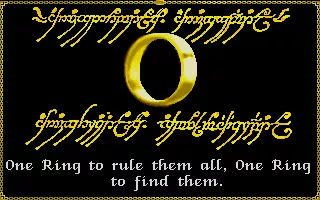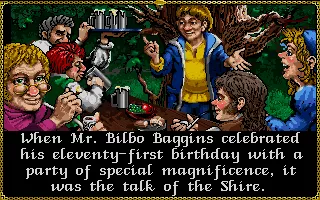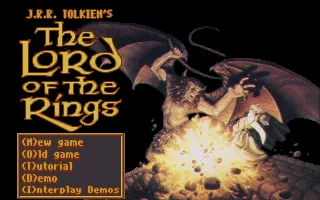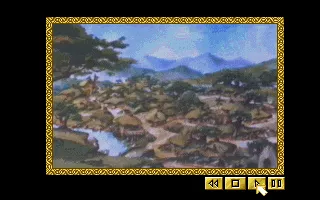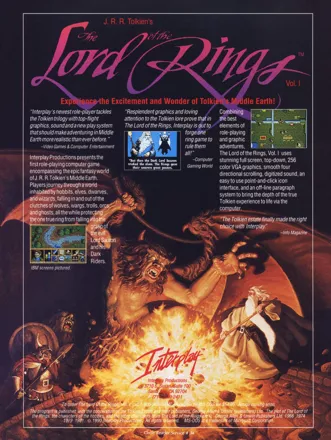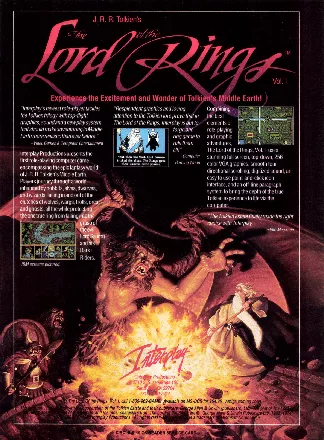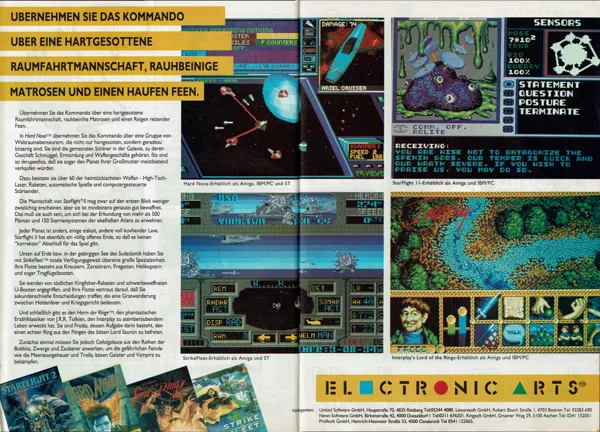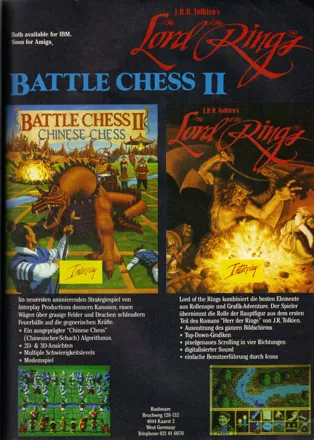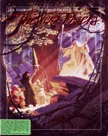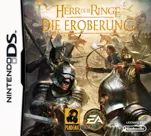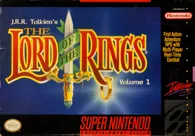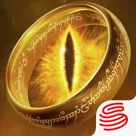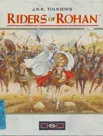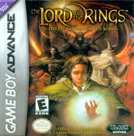J.R.R. Tolkien's The Lord of the Rings, Vol. I
Description official descriptions
Many years ago, the dark lord Sauron forged the One Ring to control the races of the Middle Earth. He was defeated by the human prince Isildur, who took the ring to himself. But such was the evil power of the ring that it brought misfortune to whoever dared to bear it, corrupting their souls. Eventually, the ring ended up by Frodo Baggins, a peaceful hobbit who was unaware of his possession's true nature. Realizing that the only way to be free of the ring's power would be to destroy it, the wizard Gandalf tells Frodo to carry it to Sauron's land, Mordor, and throw it into the lava rivers of the Orodruin volcano, thus saving Middle Earth from destruction.
J.R.R. Tolkien's The Lord of the Rings, Vol. I is a fantasy role-playing game based on The Fellowship of the Ring, the first volume of the Lord of the Rings book trilogy by J.R.R. Tolkien. The events of the game follow those depicted in the book rather closely, though a few characters and occurrences are not present, and many quests have been added. Characters belonging to various races and nations join Frodo on his quest; these include key figures from the book as well as several characters unique to the game.
The game is rather open-ended, allowing the player to roam vast top-down environments and undertake side missions in addition to the main storyline, which must be followed in order to complete the game. Combat takes place in the same area as exploration, and is turn-based. The player has full control over the actions of the characters in the party. These characters can also be swapped, equipped with weapons and armor, and use various skills (individual and shared), such as sneaking, perception (to find hidden items), unique "words of power", and others.
Unlike the vast majority of role-playing games, there are no experience points or character levels in the game. Player-controlled party becomes stronger by obtaining better equipment and items, learning new abilities, and recruiting stronger characters that would help the weak hobbits to survive encounters with Nazguls and other dangerous creatures. There are optional ways to access major locations, and much of the combat in the game can be avoided.
The CD version of the game features cutscenes taken from the animated Lord of the Rings movie by Ralph Bakshi. The original floppy release often required the players to read story-related text from the manual; the CD version inserts this text into the game itself at the appropriate places. It also adds an automapping feature to the game.
Spellings
- 指輪物語 第一巻 旅の仲間 - Japanese spelling
Groups +
Screenshots
Promos
Credits (DOS version)
33 People (29 developers, 4 thanks) · View all
| Executive Producer | |
| Programming | |
| Design | |
| Producer | |
| Assistant Producer | |
| Artists | |
| Music | |
| Programming Assistance | |
| Production Assistance | |
| Playtesting | |
| Manual Illustration | |
| Manual | |
| [ full credits ] | |
Reviews
Critics
Average score: 70% (based on 24 ratings)
Players
Average score: 3.7 out of 5 (based on 25 ratings with 2 reviews)
One game to find them, and to lack of levels bind them
The Good
After Interplay delivered the groundbreaking Wasteland, they continued to conduct experiments in the field of role-playing games with a bold move: an adaptation of one of the most influential books in the history of the century (at least in the realm of the fantasy genre): J.R.R. Tolkien's Lord of the Rings.
First, a few words of warning: this game covers only the first volume of the story, and even that not in its entirety. The plot ends with a confrontation that was not present in the book, slightly before the original final chapters. So if you are looking for an exact reenactment of the epic work, you are probably going to be disappointed. The game is slow-paced and you'll have to go through a lot of gameplay to get to the famous dramatic events; it is not a cinematic action game, but an RPG with open-ended wandering, party management, and so on. In my eyes, however, this is a plus: I never expect games to mimic books or movies; on the contrary, I want them to focus on gameplay as much as they can.
The game's world is vast, almost seamless (there are transitions between very large areas), and fairly open-ended. You must find a few crucial items and info to complete the game, but the bulk of the gameplay is dedicated to simply exploring the world, searching for things to do. There are plenty of houses, characters, optional locations, and other stuff to look for for. The game doesn't restrict your movement and allows you to gradually become acquainted with its world. What I particularly love in this sort of games are all those shortcuts, optional paths, and other tricks they allow you to do. Lord of the Rings does a very good job at being flexible that way. Don't want to go through a maze-like forest? You can take the main road - but a tough battle awaits you there. Had enough of the huge, multi-leveled dungeon they have made out of the Moria mines? Find a shortcut that would lead you straight to Balrog.
The game tries to keep the main plot as far away from you as possible; I consider this an excellent achievement the designers should be commended for. Too many games, licensed or otherwise, force events down your throat; on the other hand, games based on other popular media often ignore too much of the material that made the original attractive in the first place. Lord of the Rings contains most of the story and the characters, but inserts them into the game in such a fashion that they rarely stand in your path. You can, theoretically, avoid most battles and march into Moria with Frodo alone. You can totally skip important events such as Old Man Willow or the meeting in Bree. You can recruit Boromir, take his equipment, and then kick him out of the party - and there is nothing he'll be able to do about that.
Yet, if you are nostalgically-minded, you can try to cling to the plot with a fair degree of success. It's all there - you'll just have to find it. Tom Bombadil is waiting for you in his house and he will ask you to give him the ring - and it will be up to you to agree or decline. Gandalf is calmly sitting outside of Elrond's house: talk to him if you want, and you'll have a powerful wizard in your party; or just walk away. The game also adds tons of optional content that, for the most part, fits the story very well. Fancy discovering ancient ruins in the Shire, duking it out with trolls, investigating a murder, etc. Many characters that were not present in the book join your party, and some of them have backgrounds and personal objectives.
The CD version is vastly superior to the floppy release. Its most important addition is the much-needed automap: with the stroke of a key, you can access a zoomed-out view of the location, which is extremely helpful in a game with vast and fairly monotonous areas. It also puts the manual information serving as copy protection into the game itself. This version greatly enhances atmosphere and the quality of presentation by adding a beautifully orchestrated soundtrack, and inserting quite a few cutscenes taken directly from Ralph Bakshi's 1978 Lord of the Rings cartoon. True, that movie may not have been the ultimate Tolkien-based product, but its artistic and technical quality is clearly above what we usually saw in video games back then. These scenes add a lot of dramatic flow to the game's otherwise laid-back pace.
The Bad
Basing a game on a well-known work of literature is always a very tricky business. Interactive entertainment poses different demands, rightly putting gameplay above the narrative in its scale of preferences. Interplay's Lord of the Rings valiantly tried to faithfully follow the plot while pushing forward its gameplay ideas as much as it could. This, however, led to some discrepancies, the most glaring of which is odd balancing. In order to stay true to the story, the game had to have a certain event that gives you access to four or five very powerful characters at once. These render many subsequent fights so easy that you feel you've been given cheat codes. I think they could have at least made some enemies tougher to pose a challenge for the extremely beefed-up party. In general, the absence of systematically placed challenges undermines the overall structure: you can clearly sense what evolved naturally from the game's mechanics and what was forced upon it by the iron hand of the plot.
The game's open nature sometimes leads to repetitiveness that is further exacerbated by a plain, unattractive visual design. Most outdoor areas consists of identically-looking green meadows and brown roads; houses and dungeons sorely lack detail as well. Dialogues are painfully short and impersonal. You can type in keywords to talk to characters, but this feature is woefully underused. I tried chatting with those guys about everything I could think of, but they remained indifferent: "Hello Frodo. I'm a fellow hobbit who lives to the left of your house". - "Hobbit". - "I can't help you with that". - "Fellow". - "I can't help you with that". - "Left". - "I can't help you with that". - "House". - "I can't help you with that". Talking to people isn't worth much if they don't want to talk to you.
My main problem with the game, however, is the lack of what many would consider the backbone of any RPG: character growth through experience. There are no character levels and no experience points of any kind. Combat, therefore, becomes completely pointless and is thus best avoided. In my mind, this is a very serious blow to any game that has the words "role-playing" in it: seeing your heroes master new skills and turn from pathetic weaklings into walking tanks is one of the chief reason for playing this sort of games in the first place.
The Bottom Line
Interplay's Lord of the Rings has attractive qualities such as considerable freedom of choice and gameplay flexibility. However, the book-to-game conversion sometimes feels rough and forced, to the point of interfering and damaging the flow of the game. It just doesn't work very well as an RPG, paying a lot of attention to minor elements while neglecting the basics.
DOS · by Unicorn Lynx (181636) · 2015
This game introduced me to the book!
The Good
This game's story, while it doesn't exactly follow the book's plot (especially toward the end), stays pretty faithful while adding a bunch of side-quests and extra locations/characters/encounters. I would say that it manages to convey the feel of the books very well, starting out in a homely setting of the Shire and then moving to the darker, more forlorn places of Middle Earth.
The graphics are pretty decent for 1990, through today you may find them rather pixelated and clunky. I especially liked the character portraits. All of them were so detailed that they became in my mind the way the characters should look (and I actually compared them to the movie's cast. I think the game's Frodo is more fitting to the book's description than Elija Wood).
The Bad
The interface is probably the game's one biggest shortcoming. Most of the actions are to be performed by hitting hotkeys, which are not immediately obvious from the screen. At some places you actually need to type things in (such as for conversations), and you may end up hunting for the right keyword to say to an NPC.
A lesser annoyance is the game's reliance of written passages from the manual whenever it needs to tell a sizable portion of the story. I guess wishing for these things to be presented in-game is too much to ask for, but make sure you have the manual in hard copy when you play so you don't have to quit the game to read a passage. Also there's more of a chance for spoilage if you go to a passage you weren't supposed to read.
The Bottom Line
Overall, I would recommend this game to anyone who has the patience for its interface. The progress is rather slow, much like in JRRT's book, but the settings and the quests are well crafted, and suit the source material. If you have the imagination to compensate for the low abilities of 1990 hardware, you will find this game does a pretty good job of transporting you into Middle Earth.
DOS · by Lev Epshteyn (10) · 2002
Discussion
| Subject | By | Date |
|---|---|---|
| C64 release | Edwin Drost (10559) | May 11, 2017 |
| Has anyone played this? | Unicorn Lynx (181636) | Oct 20, 2011 |
Analytics
Identifiers +
Contribute
Are you familiar with this game? Help document and preserve this entry in video game history! If your contribution is approved, you will earn points and be credited as a contributor.
Contributors to this Entry
Game added by Rogee.
Amiga added by JRK. PC-98, FM Towns added by Terok Nor.
Additional contributors: 6⅞ of Nine, Infernos.
Game added April 21, 2001. Last modified June 27, 2024.


